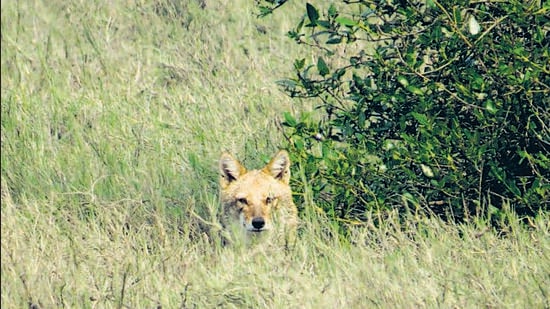Study launched on golden jackals in city’s mangrove patches
Amongst the wild canidae found in India, golden jackals are the most widespread species, occupying varied habitat types ranging from forests and grasslands to agricultural landscapes. The mangrove ecosystem is one unique habitat used by golden jackals
Mumbai: A first-of-its-kind scientific research study on the golden jackal and other small carnivores in the Mumbai Metropolitan Region (MMR) has been initiated in a collaboration between the Mangrove and Marine Biodiversity Conservation Foundation of Maharashtra and the Wildlife Conservation Society-India. Titled ‘Baseline survey on golden jackal distribution in the Mumbai Metropolitan Region’, the study will be conducted between December 2022 and June 2023 in different phases covering mangrove forest patches at the Thane Creek flamingo sanctuary and in Central, Western and Navi Mumbai.

Amongst the wild canidae found in India, golden jackals are the most widespread species, occupying varied habitat types ranging from forests and grasslands to agricultural landscapes. The mangrove ecosystem is one unique habitat used by golden jackals, and the objective of the study is to document their presence and that of other small carnivores in this habitat by using sign surveys and remotely triggered camera traps.
After initial reconnaissance surveys conducted during the first two months, the research team will finalise suitable methods and techniques to document and study the small-carnivore ecology from this habitat. The study also aims to understand jackals’ diet and study interspecific interactions between jackals, domestic dogs and humans, said Nikit Surve from the Human-Wildlife Interactions Program at the Wildlife Conservation Society–India, who will be leading this project along with Dr Devcharan Jathanna of WCS-India.
Jackals have existed in Mumbai right from the time Mumbai was an archipelago of seven islands. About 109 years ago, golden jackals were documented being chased by a pack of wild dogs from Charni Road station to Marine Drive (as noted by Kothari and Chapghar in their book documenting India’s wildlife from archival records). Today, golden jackals are restricted to the mangrove forests in MMR.
Currently, there is very little information on the ecology of golden jackals from the mangrove habitats of Mumbai, Thane and Navi Mumbai and no data on their population and distribution. Most of the available information is based on the sightings of Nature enthusiasts, bird-watchers and rescue operations by NGOs. This study will fill that lacuna.
“Golden jackals form an important part of the food chain in the mangrove ecosystem. This study will help us understand their ecology in this habitat and thereby help in their conservation along with other species,” said Manas Manjrekar, Deputy Director, Research and Capacity-Building, Mangrove and Marine Biodiversity Foundation of Maharashtra.
Surve remarked on the “fascinating” carnivore species assemblage of Mumbai ranging from leopards in Sanjay Gandhi National Park to other small carnivores like golden jackals, jungle cats, mongooses, civets and smaller mammals. “Through this study, we will learn more about how small carnivores like jackals survive in the urban mangrove forest,” he said. “We are also excited about the involvement of citizens who are sensitive towards Nature and wildlife conservation, as a sense of ownership towards these species will help spread awareness and their conservation.”
Stay updated with all the Breaking News and Latest News from Mumbai. Click here for comprehensive coverage of top Cities including Bengaluru, Delhi, Hyderabad, and more across India along with Stay informed on the latest happenings in World News.
Stay updated with all the Breaking News and Latest News from Mumbai. Click here for comprehensive coverage of top Cities including Bengaluru, Delhi, Hyderabad, and more across India along with Stay informed on the latest happenings in World News.





